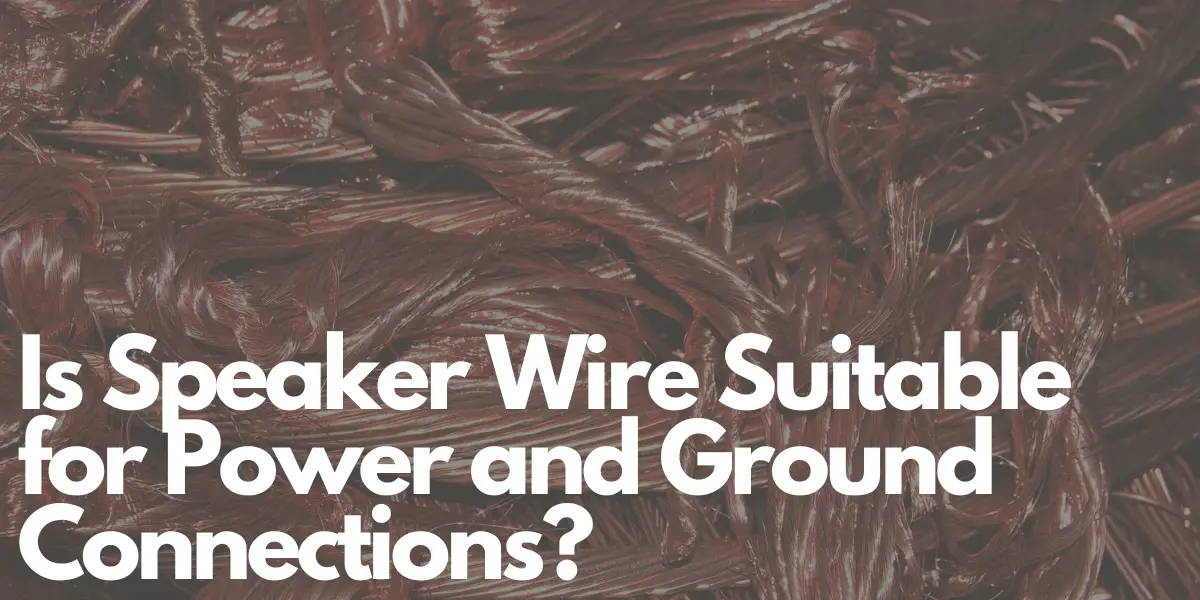If you’ve ever wondered whether you can use speaker wire for power and ground connections, the answer is yes, but it’s not the most advisable choice. Speaker wire is primarily designed for transmitting audio signals and isn’t optimized for carrying power. In this article, we’ll explore the reasons why using speaker wire for power and ground connections may not be the best idea and discuss the precautions you can take if you have no other option.
Understanding Voltage Drop
One of the main issues with using speaker wire for power and ground connections is voltage drop. Voltage drop is the decrease in voltage that occurs as electricity travels through a conductor. Speaker wire consists of relatively thin copper conductors, which have higher resistance compared to thicker copper conductors typically used for power transmission. As a result, when you use speaker wire for power, it’s more prone to voltage drop.
Voltage drop can be problematic for devices that require a specific voltage to operate correctly. For instance, if a device needs a stable 12V supply, excessive voltage drop can lead to operational issues or even render the device ineffective.
Durability Concerns
Another drawback of using speaker wire for power and ground connections is its lower durability when compared to dedicated power wires. Speaker wire is more susceptible to damage, which could result in a short circuit or even a fire hazard. This is a significant safety concern, especially if you’re using speaker wire in a critical application.
Choosing the Right Gauge
If you find yourself in a situation where using speaker wire for power and ground connections is unavoidable, selecting the appropriate gauge is crucial. The gauge of wire you need depends on the amount of current you intend to carry. Here’s a simple guideline:
- Up to 5 amps: Use 16 AWG speaker wire.
- 5 to 10 amps: Opt for 14 AWG speaker wire.
- 10 to 20 amps: Select 12 AWG speaker wire.
- Over 20 amps: Consider using 10 AWG speaker wire.
When in doubt, it’s generally safer to choose a thicker gauge wire than you think you’ll need. This helps minimize the risk of voltage drop and overheating.
Preventing Damage to Speaker Wire
To ensure the safety and reliability of your setup when using speaker wire for power and ground connections, follow these precautions:
- Use a Conduit: Running the speaker wire through a conduit offers protection from physical damage, ensuring it remains intact and safe.
- Cable Ties: Secure the speaker wire to a solid surface using cable ties or other fasteners. This prevents the wire from being pulled or damaged accidentally.
- Avoid Sharp Edges: Keep the speaker wire away from sharp edges or abrasive surfaces, such as the edges of metal panels, to prevent abrasion or cuts.
- Regular Inspections: Perform routine inspections of the speaker wire for signs of wear or damage. If you notice any issues, replace the wire immediately to avoid potential hazards.
When Not to Use Speaker Wire for Power and Ground
While speaker wire can be used for power and ground connections in some scenarios, there are situations where it’s definitely not recommended:
- High-Current Applications: Avoid using speaker wire for high-current applications, like powering a high-wattage amplifier. Speaker wire isn’t designed to handle high currents and could overheat or pose a fire risk.
- Long Cable Runs: For lengthy cable runs, it’s better to opt for dedicated power wires rather than speaker wire. The higher resistance of speaker wire can result in excessive voltage drop over long distances.
- Critical Applications: In critical applications, such as powering medical devices or safety systems, it’s best to use power wire. Speaker wire may not provide the reliability needed, potentially leading to device malfunctions.
In conclusion, while it is possible to use speaker wire for power and ground connections when necessary, it comes with certain limitations and risks. To ensure safety and reliability, always choose the appropriate gauge, take preventive measures to protect the wire, and consider alternative wiring options for high-current, long-distance, or critical applications. Your safety and the proper functioning of your electrical devices should always be the top priority.
Author: Mike P
Hi! My name is Mike! I’ve been an apartment producer/musician for 10+ years. I’ve played in punk bands, released EDM tunes on Beatport and iTunes, and have a semi-successful stock music portfolio. Read more…



